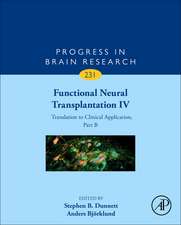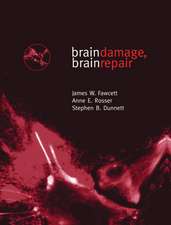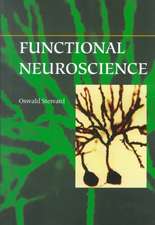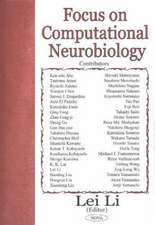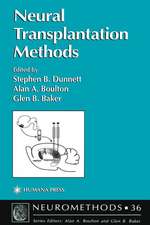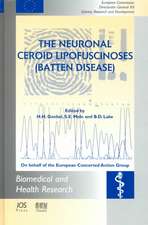Huntington’s Disease: Methods in Molecular Biology, cartea 1780
Editat de Sophie V. Precious, Anne E. Rosser, Stephen B. Dunnetten Limba Engleză Hardback – iun 2018
Authoritative and invaluable, Huntington’s Disease aims to help scientists to significantly extend the breadth and quality of research in laboratories dedicated to mastering and controlling this devastating human condition.
| Toate formatele și edițiile | Preț | Express |
|---|---|---|
| Paperback (1) | 1159.65 lei 39-44 zile | |
| Springer – 25 iul 2019 | 1159.65 lei 39-44 zile | |
| Hardback (1) | 1848.33 lei 6-8 săpt. | |
| Springer – iun 2018 | 1848.33 lei 6-8 săpt. |
Din seria Methods in Molecular Biology
- 9%
 Preț: 791.63 lei
Preț: 791.63 lei - 23%
 Preț: 598.58 lei
Preț: 598.58 lei - 20%
 Preț: 882.98 lei
Preț: 882.98 lei -
 Preț: 252.05 lei
Preț: 252.05 lei - 5%
 Preț: 802.70 lei
Preț: 802.70 lei - 5%
 Preț: 729.61 lei
Preț: 729.61 lei - 5%
 Preț: 731.43 lei
Preț: 731.43 lei - 5%
 Preț: 741.30 lei
Preț: 741.30 lei - 5%
 Preț: 747.16 lei
Preț: 747.16 lei - 15%
 Preț: 663.45 lei
Preț: 663.45 lei - 18%
 Preț: 1025.34 lei
Preț: 1025.34 lei - 5%
 Preț: 734.57 lei
Preț: 734.57 lei - 18%
 Preț: 914.20 lei
Preț: 914.20 lei - 15%
 Preț: 664.61 lei
Preț: 664.61 lei - 15%
 Preț: 654.12 lei
Preț: 654.12 lei - 18%
 Preț: 1414.74 lei
Preț: 1414.74 lei - 5%
 Preț: 742.60 lei
Preț: 742.60 lei - 20%
 Preț: 821.65 lei
Preț: 821.65 lei - 18%
 Preț: 972.30 lei
Preț: 972.30 lei - 15%
 Preț: 660.49 lei
Preț: 660.49 lei - 5%
 Preț: 738.41 lei
Preț: 738.41 lei - 18%
 Preț: 984.92 lei
Preț: 984.92 lei - 5%
 Preț: 733.29 lei
Preț: 733.29 lei -
 Preț: 392.60 lei
Preț: 392.60 lei - 5%
 Preț: 746.26 lei
Preț: 746.26 lei - 18%
 Preț: 962.66 lei
Preț: 962.66 lei - 23%
 Preț: 860.22 lei
Preț: 860.22 lei - 15%
 Preț: 652.64 lei
Preț: 652.64 lei - 5%
 Preț: 1055.50 lei
Preț: 1055.50 lei - 23%
 Preț: 883.87 lei
Preț: 883.87 lei - 5%
 Preț: 1141.13 lei
Preț: 1141.13 lei - 19%
 Preț: 491.89 lei
Preț: 491.89 lei - 5%
 Preț: 1038.86 lei
Preț: 1038.86 lei - 5%
 Preț: 524.16 lei
Preț: 524.16 lei - 18%
 Preț: 2122.34 lei
Preț: 2122.34 lei - 5%
 Preț: 1299.23 lei
Preț: 1299.23 lei - 5%
 Preț: 1339.12 lei
Preț: 1339.12 lei - 18%
 Preț: 1390.26 lei
Preț: 1390.26 lei - 18%
 Preț: 1395.63 lei
Preț: 1395.63 lei - 18%
 Preț: 1129.65 lei
Preț: 1129.65 lei - 18%
 Preț: 1408.26 lei
Preț: 1408.26 lei - 18%
 Preț: 1124.92 lei
Preț: 1124.92 lei - 18%
 Preț: 966.27 lei
Preț: 966.27 lei - 5%
 Preț: 1299.99 lei
Preț: 1299.99 lei - 5%
 Preț: 1108.51 lei
Preț: 1108.51 lei - 5%
 Preț: 983.76 lei
Preț: 983.76 lei - 5%
 Preț: 728.16 lei
Preț: 728.16 lei - 18%
 Preț: 1118.62 lei
Preț: 1118.62 lei - 18%
 Preț: 955.25 lei
Preț: 955.25 lei - 5%
 Preț: 1035.62 lei
Preț: 1035.62 lei
Preț: 1848.33 lei
Preț vechi: 2254.06 lei
-18% Nou
Puncte Express: 2772
Preț estimativ în valută:
353.68€ • 385.38$ • 298.02£
353.68€ • 385.38$ • 298.02£
Carte tipărită la comandă
Livrare economică 24 aprilie-08 mai
Preluare comenzi: 021 569.72.76
Specificații
ISBN-13: 9781493978243
ISBN-10: 1493978241
Pagini: 794
Ilustrații: XV, 642 p. 111 illus., 74 illus. in color.
Dimensiuni: 178 x 254 mm
Greutate: 1.35 kg
Ediția:1st ed. 2018
Editura: Springer
Colecția Humana
Seria Methods in Molecular Biology
Locul publicării:New York, NY, United States
ISBN-10: 1493978241
Pagini: 794
Ilustrații: XV, 642 p. 111 illus., 74 illus. in color.
Dimensiuni: 178 x 254 mm
Greutate: 1.35 kg
Ediția:1st ed. 2018
Editura: Springer
Colecția Humana
Seria Methods in Molecular Biology
Locul publicării:New York, NY, United States
Cuprins
Stereological Methods to Quantify Cell Loss in the Huntington’s Disease Human Brain.- Assessing Autophagic Activity and Aggregate Formation of Mutant Huntingtin in Mammalian Cells.- A Filter Retardation Assay Facilitates the Detection and Quantification of Heat-Stable, Amyloidogenic Mutant Huntingtin Aggregates in Complex Biosamples.- Cellular Models: HD Patient-Derived Pluripotent Stem Cells.- Non-Mammalian Models of Huntington’s Disease.- Mouse Models of Huntington’s Disease.- Motor Assessment in Huntington’s Disease Mice.- Automated Operant Assessments of Huntington’s Disease Mouse Models.- Neurophysiological Assessment of Huntington’s Disease Model Mice.- Murine Models of Huntington’s Disease for Evaluating Therapeutics.- Generating Excitotoxic Lesion Models of Huntington’s Disease.- Large-Brained Animal Models of Huntington’s Disease: Sheep.- Minipigs as Large-Brained Animal Model for Huntington’s Disease: From Behavior and Imaging to Gene Therapy.- Non-Human Primate Models of Huntington’s Disease and Their Application in Translational Research.- In Vivo Multidimensional Brain Imaging in Huntington’s Disease Animal Models.- Magnetic Resonance Imaging in Huntington’s Disease.- Biofluid Biomarkers in Huntington’s Disease.- Assessing and Modulating Kynurenine Pathway Dynamics in Huntington’s Disease: Focus on Kynurenine 3-Monooxygenase.- Assessing Mitochondrial Function in In Vitro and Ex Vivo Models of Huntington’s Disease.- Using Genomic Data to Find Disease-Modifying Loci in Huntington’s Disease (HD).-CRISPR/Cas9-Mediated Genome Editing for Huntington's Disease.- Methods for Assessing DNA Repair and Repeat Expansion in Huntington’s Disease.- Translating Antisense Technology into a Treatment for Huntington’s Disease.- Disease Modification through Trophic Factor Delivery.- Methods to Quantify Cell Signaling and GPCR Receptor Ligand Bias: Characterization of Drugs that Target the Endocannabinoid Receptors in Huntington’s Disease.- Dissection and Preparation of Human Primary Fetal Ganglionic Eminence Tissue for Research and Clinical Application.- Robust Induction of DARPP32-Expressing GABAergic Striatal Neurons from Human Pluripotent Stem Cells.- Quality Assessment and Production of Human Cells for Clinical Use.
Textul de pe ultima copertă
This detailed book provides a laboratory manual and guidebook for the selection, implementation, and interpretation of a wide range of techniques in contemporary use in leading laboratories engaged in Huntington’s disease (HD) research worldwide. Only by understanding the pathology and pathogenic process at the fundamental molecular and cellular level can the research community expect to be able to slow or halt the disease process, repair the damage, and develop novel effective therapies to treat the symptoms of this condition, thus this volume collects the practical knowledge of its authors. Written for the highly successful Methods in Molecular Biology series, chapters include introductions to their respective topics, lists of the necessary materials and reagents, step-by-step, readily reproducible laboratory protocols, and tips on troubleshooting and avoiding known pitfalls.
Authoritative and invaluable, Huntington’s Disease aims to help scientists to significantly extend the breadth and quality of research in laboratories dedicated to mastering and controlling this devastating human condition.
Caracteristici
Includes cutting-edge techniques for the study of Huntington's Disease Provides clear details essential for reproducible results Contains practical insights from experts in the field

